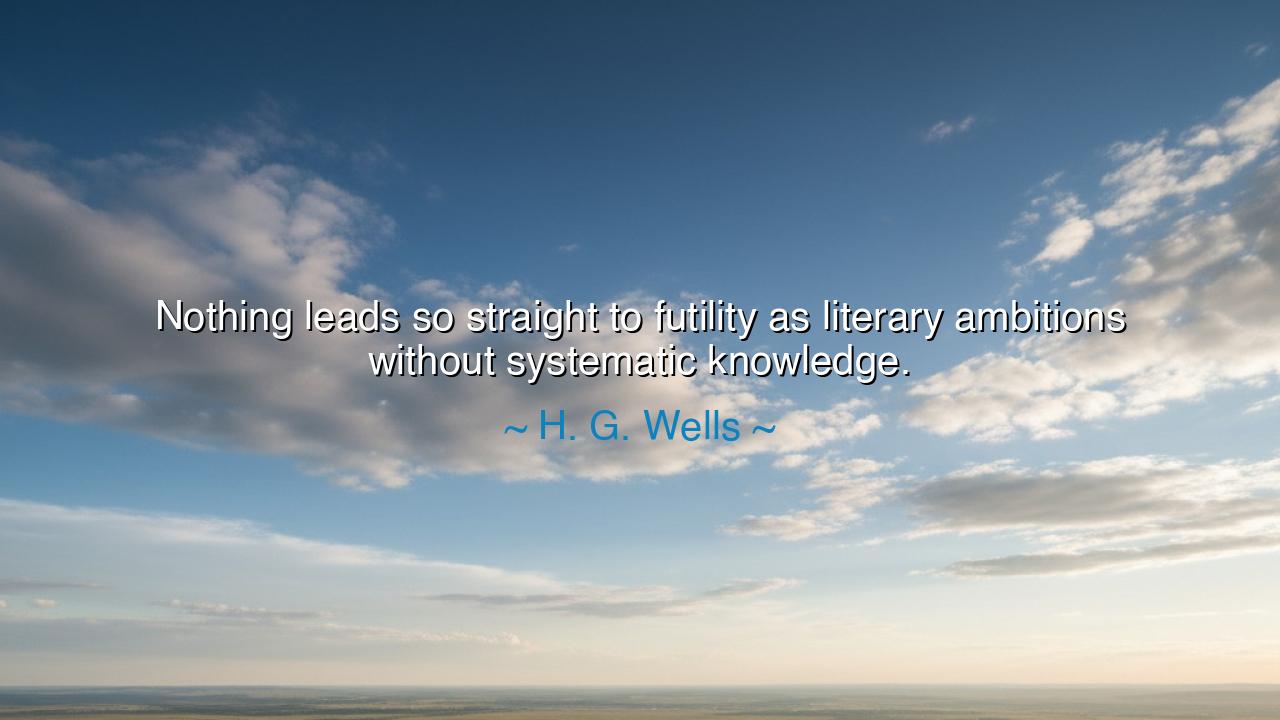
Nothing leads so straight to futility as literary ambitions
Nothing leads so straight to futility as literary ambitions without systematic knowledge.






Hear, O seekers of truth, the solemn warning of H. G. Wells, master of visions and dreams, who declared: “Nothing leads so straight to futility as literary ambitions without systematic knowledge.” In this utterance is revealed the peril of desire unmoored from discipline, of ambition soaring on wings too frail to carry it. For words, though beautiful, are empty when not rooted in understanding; and ambition, though fiery, burns to ash when not sustained by knowledge.
Many are they who long to write, who yearn for the glory of authorship, who imagine themselves creators of immortal works. They fill pages with passion, yet their words falter and collapse, for their foundations are weak. Without the strength of systematic knowledge—of history, of science, of the great traditions of thought—their creations are like castles built upon sand. They may rise for a moment, glittering in the sunlight, but the tide of time will sweep them away, leaving no trace behind.
Wells himself was not only a man of letters but a student of the world. Before he penned his visions of the future, he studied biology under the great Thomas Huxley, grounding his imagination in the bedrock of science. Thus, when he wrote of time travel, invisible men, and alien invasions, his tales carried the weight of plausibility. They were not mere fancies, but thought-experiments drawn from systematic knowledge, which gave his literary ambitions the power to endure. Here lies the origin of his admonition: he had seen how study gives wings to imagination, and how ignorance chains it to futility.
Consider the tale of Leonardo da Vinci, whose works combined art with science. Had he painted only from imagination, his creations would have lacked the depth that astonished the world. But he dissected corpses to learn anatomy, studied water and wind to understand nature, filled notebooks with endless observation. His art was born of knowledge, and thus his ambitions did not wither. Contrast this with countless nameless dreamers, who sketched without study and wrote without learning—their works vanished, their ambitions forgotten, their legacy futile.
The meaning of Wells’s words is not to crush the dreamer, but to guide him. Ambition alone is a spark, but knowledge is the oil that sustains the flame. A writer, or any creator, must cultivate discipline, must seek the wisdom of others, must labor to understand before presuming to teach. For the pen is not only an instrument of beauty, but a vessel of truth, and truth demands roots deep in the soil of study.
The lesson, O listener, is carved in clarity: if you would create works that endure, do not rush only to express, but take time to learn. Read widely, study deeply, reflect endlessly. Let your imagination soar, but anchor it in the stones of systematic knowledge, lest it drift aimlessly into futility. Ambition without discipline is vanity; but ambition joined with knowledge becomes greatness.
Practical action lies before you: cultivate a daily habit of study. Read not only the works of poets and novelists, but also of philosophers, scientists, and historians. Build a foundation that will strengthen your creativity, so that your literary ambitions will stand the test of time. And above all, be patient with yourself—knowledge grows slowly, but its fruit sustains for a lifetime.
Thus remember H. G. Wells’s wisdom: the dreamer without knowledge will fade, but the dreamer with discipline will endure. Anchor your ambitions in study, and your works shall not be futile, but eternal. For in the union of imagination and knowledge lies the path to immortality.






AAdministratorAdministrator
Welcome, honored guests. Please leave a comment, we will respond soon